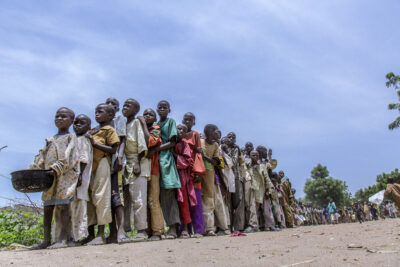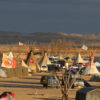Note: The Global Security and Cooperation (GSC) program’s emphasis on collaboration of “academics” and “practitioners” brings the topic of activist research to the fore. This essay is a revised version of a proposal, submitted to the GSC Committee, to carry out a series of “field-building” activities meant to explore the definition, as well as the promise and problems, of activist research on GSC-related topics. In September 2001 the Committee approved the proposal, the first step of which is to convene a workshop on this topic in the course of 2002. We hope this memo will generate comment, discussion and critique from Items readers, which can be taken into account as these plans proceed.
The proposal to make activist research a field-building priority for the GSC program rests on two central propositions. First, there is no necessary contradiction between active political commitment to resolving a problem, and rigorous scholarly research on that problem. The second proposition is that activist research has the potential to lead to better research outcomes: deeper and more thorough empirical knowledge of the problem at hand, as well as theoretical understanding that otherwise would be difficult to achieve. Inevitably activist research projects come with their share of tensions, contradictions and ethical dilemmas. A third, ancillary, proposition is that the research outcome is improved when such tensions are identified and confronted directly.
“The objective, especially at first, is not to delimit but to explore, and especially, to probe boundaries that definitions tend to present as fixed and given.”Definitions are not always helpful in the initial discussion of a broad and complex topic like this one. The objective, especially at first, is not to delimit but to explore, and especially, to probe boundaries that definitions tend to present as fixed and given. With that proviso, let me suggest a rough preliminary description of the terrain under discussion here. In this usage, the word “activist” is meant as an adjective, which qualifies and modifies the way that research methods are conceived and carried out. It is not restricted to research on or with people who are “activists”—though that is one possible focus; nor does it mean that the scholar becomes an “activist” in the usual understanding of the term. In my understanding, then, activist research: a) helps us better to understand the root causes of inequality, oppression, violence and related conditions of human suffering; b) is carried out, at each phase from conception through dissemination, in direct cooperation with an organized collective of people who themselves are subject to these conditions; c) is used, together with the people in question, to formulate strategies for transforming these conditions and to achieve the power necessary to make these strategies effective.
Activist research methods present a frontal challenge to the deeply ingrained dichotomy between “pure” and “applied” social sciences. The political scientist Donald Stokes, in a posthumously published book called Pasteur’s Quadrant (1997), advances this same challenge with regard to the development of the US natural science research establishment since WWII. It is a story that needs to be told about the social sciences as well, to help broaden the space for the kind of work I’m describing. The objective of activist research is not to replace the theoretically driven quest for understanding of basic processes with “applied” problem-solving, but rather to develop a third category of research, which is both theoretically driven and intended to be put to use. This yields a hybrid category—epitomized by the work of French scientist Louis Pasteur—which Stokes calls “use-oriented basic research.”
While endorsing the basic constructivist insight about the politically situated character of all knowledge production, activist research also contains a built-in inoculation against the excesses of radical relativism (“all knowledge claims are equally valid and justifiable”) and nihilistic deconstruction (“all knowledge claims are reducible to underlying power moves”) sometimes associated with the postmodern turn. This does not, of course, eliminate the need to subject the analytical categories we use to critical scrutiny, nor does it contradict the increasingly well-accepted premise that any knowledge we produce is—to use Donna Haraway’s (1988) term—”situated.” But activist research does bring an additional demand for empirical rigor, and a well-developed methodological canon that can guide us to produce the best possible understanding of the problem at hand, the confidence to distinguish between better and less good explanations and the means to communicate these results in a clear and useful manner.
Finally, the practice of activist research asks us to identify our deepest ethical-political convictions, and to let them drive the formulation of our research objectives. Many social science graduate training programs have precisely the opposite inclination: to become a professional researcher requires one to suppress those convictions, or at best relegate them to a separate realm of civic responsibility or community service. Despite the growing acknowledgment that all research is positioned and that our convictions do tend to seep in to inform our analytical frameworks, the emphasis in mainstream academia still is on keeping that seepage to a minimum. Activist research endorses the contrasting tack of making our politics explicit and up-front, reflecting honestly and systematically on how they have shaped our understanding of the problem at hand, and putting them to the service of our analytical endeavor.
“Activist research methods do not lend themselves to formalization.”Activist research methods do not lend themselves to formalization; Miles Horton and Paolo Freire, two pioneers, in the related field of education and social change, sum it up in the title of their recent collaborative book (1990), “we make the road by walking.” But there is a series of basic methodological steps that one attempts to take in an activist research project. They are rarely achieved completely, but if any one of them is completely absent, the broader purpose of activist research may not be met.
Arriving at research questions and objectives: Activist research requires a process of dialogue and collective work with the subjects of study prior to the finalization of the research design. Through collective work you identify a common set of problems, analytical puzzles, gaps in existing knowledge that the people in question are genuinely and explicitly interested in addressing. In any given GSC-related topic, for example, there are aggrieved or relatively powerless groups of people who will care intensely about the issues and questions at stake. The activist scholar will have, or develop, particular affinities with one such group of people (or at times more than one), and give special priority to the dialogue with them. If they are organized, all the better—and here enters the GSC program’s emphasis on collaboration with “practitioner” organizations—but at times they will not or cannot be. Building on affinities in this way does not require one to neglect alternative or contrasting perspectives; it does not assume that the group is completely unified or free from internal division; nor does it prevent stepping back to take in the big picture—indeed the research design must involve precisely that. It does provide some assurance that the research objectives, from the outset, coincide at least in part with what actors in the processes under study think it is important to know and to understand.
Data collection methods: Activist research draws on the entire range of methodological tools available in conventional social science endeavors. The principal methodological mandate involves some form of participation among interested subjects, groups or communities in the research process. This is substantially different from the tried-and-true anthropological practice of selecting “key informants” on whom we rely heavily to help us interpret what we see, and who often receive compensation for their services. The goal is to carry out the research such that a specified group of people can actively participate, thereby learning research skills themselves, contributing to the data collection, taking an active role in the process of knowledge creation.
Interpretation and analysis of the data: Here again the emphasis is on making the data analysis partly a collective endeavor, especially involving those who have been active participants in the research process. If the research is being carried out in connection with an organization, this kind of collective analysis will naturally follow. Regardless, the principle is to move toward breaking down the rigid dichotomy between “they” the providers of raw data and “we” the analysts, giving “them” the opportunity to make sense of the data they have provided and to compare their conclusions with your own. This mandate does not rest on a naïve, pseudo-populist assumption that the study’s conclusions will be determined or completely redefined through the intervention of the research subjects, but rather that by participating they will enrich the analysis, and also take possession of the results in ways that could be useful for their own purposes.
Dissemination of research products: This component is the most compatible with conventional social science, in that even those most committed to the image of a detached, neutral and objective scientific observer of society are generally not averse to offering “expert knowledge” as “public intellectuals.” The main difference is that dissemination of activist research findings is crucial to close the circle opened by the initial dialogue on research questions and objectives, to discharge commitments acquired in that dialogue. The assumption is that one or more groups of people—especially those with whom particular affinities have developed—are interested in receiving the knowledge we have produced, in forms that will be useful to them. This requirement is especially challenging for academics, who often prefer prose that is only intelligible to others in their clan. The challenge deepens if we resist the dichotomy between the empirical bottom-line (for them) and the theoretical repercussions (for us), and attempt to communicate generalized or theoretical findings in an educational and useful form.
Validation of the research results: This component diverges most radically from conventional social science research, and therefore is bound to be the most controversial. According to conventional assumptions, validation occurs through review (often anonymous) by the community of scholars with expertise and experience in the particular area of research. This validation process has great intrinsic strengths and value that cannot be discounted. Activist research contributes another standard of validation, which follows from Stokes’ characterization of Pasteur’s quadrant—”use-oriented basic research.” Has the research produced knowledge that helps to resolve the problem, to guide some transformation, which formed part of the research objectives from the start? Is the knowledge useful? If so, to whom? Although the question can and should be posed in general terms, it also comes in a more pointed form, since the activist research project will previously have identified a group of people who are specifically motivated to learn and use what the researcher purports to have found out.
“It is an explicit invitation to put our training and expertise in the hands of an organization, a community or a group of positioned individuals, identifying a problem together with them, and using a participatory research process to study it.”
A sweeping claim to “better” results from activist research will no doubt prove difficult to substantiate. But it surely can be defended on at least two more particular grounds: a) people, who ultimately are the sources of social science “data,” tend to provide much more, and much higher quality, information when they feel they have an active stake in the research process. Often, especially when the topic is charged or sensitive, they only provide information under these conditions; b) collective participation of these “subjects” in data collection and its interpretation inevitably enriches what we end up learning from the research. In my own experience, this “validation” criterion makes the motivation for doing high-quality, rigorous research considerably stronger. It is the difference between the momentary sting of critique from fellow colleagues, and the grave responsibility of having a direct and demonstrable impact on the lives of people and on a given political processes. It is an explicit invitation to put our training and expertise in the hands of an organization, a community or a group of positioned individuals, identifying a problem together with them, and using a participatory research process to study it. While there are no guarantees that the outcome will be successful or even constructive, if our goal is for the research to have tangible and practical impact we need scholars who are willing to forgo the relative security of conventional methods and accept the risks of innovation.
I readily admit that this type of research raises a myriad of problems, contradictions and quandaries. A short list of such concerns would include:
• What about when you’re studying powerful people and institutions, with whom you do not identify ethically or politically?
• What if you uncover information or analysis that could be detrimental to (or even, perceived as unduly critical of) the interests of the very people with whom you have developed a privileged relationship?
• What if your research, e.g., on both sides of a conflict, requires that they perceive you as strictly “neutral,” “objective,” or “nonaligned,” which goes contrary to your own ethical-political sensibilities?
• What if part of your research uncovers influences that shape the consciousness of your “privileged subjects” in ways that orient them to distrust or dismiss the key practical implications of your findings?
I’ve thought about these and other quandaries, and to most I have what I consider to be reasonable responses. But there are no guarantees, only the partial consolation that the problems they raise, though complex and at times even intractable, also form a crucial part of the very processes that we are setting out to understand. This, in turn, reiterates a principal conclusion that I have drawn from anthropological research on ethnic and racial conflict in Latin America over the past 20 years. I have learned most, felt most sure that my own research program is on track and had most confidence in the validity and importance of the results when I have been able to see my research findings being used to understand and confront problems that I, and those who I have worked most closely with, care deeply about resolving.
References
Greenwood, Davydd J., and Morten Levin. 1998. Introduction to Action Research: Social Research for Social Change. London: Sage.
Haraway, Donna. 1988. “Situated Knowledges: The Science Question in Feminism and the Privilege of Partial Perspective.” Feminist Studies 14(3): 575–599.
Horton, Miles, and Paolo Freire. 1990. We Make the Road by Walking: Conversations on Education and Social Change. Philadelphia: Temple University Press.
Stokes, Donald E. 1997. Pasteur’s Quadrant: Basic Science and Technological Innovation. Washington, DC: Brookings.
Charles R. Hale is professor of anthropology and African and African diaspora studies, and director of the Teresa Lozano Long Institute of Latin American Studies (LLILAS) at the University of Texas, Austin. He was a member of the the SSRC’s Global Security and Cooperation (GSC) program committee (1997–2003) and also served on the regional advisory panel for the Joint Committee on Latin America (2001–2004). He also received an International Peace and Security Studies-MacArthur Foundation Postdoctoral Fellowship grant from the Council in 1988–89.
This essay originally appeared in Items & Issues Vol. 2, No. 1-2 in the Summer of 2001. Visit our archives to view the original as it first appeared in the print editions of Items.













